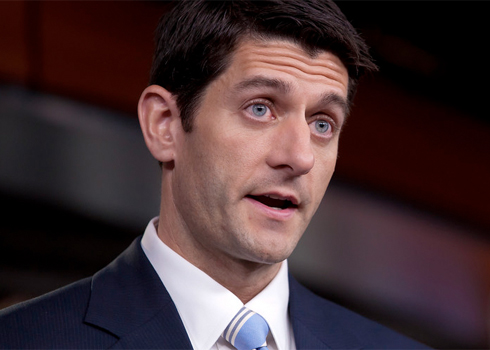When Congress reconvenes next month, Republicans will begin a renewed push for a Medicare privatization plan proposed by Rep. Paul Ryan (R-WI). But a number of recent polls show that Republicans could have a tricky time making their case to the public.
In essence, the Ryan plan calls for privatizing Medicare and capping payments in the form of vouchers as a way to reduce spending. On it’s face, the proposal garners tepid public support, particularly when presented as a necessity to reduce the deficit. However, when explained more fully, support for the Ryan plan evaporates.
Consider two polls of adult Americans released this week that framed the debate in two different ways.
A CBS/New York Times poll released on Thursday presented the question this way:
In order to reduce the budget deficit, it has been proposed that Medicare should be changed from a program in which the government pays doctors and hospitals for treating seniors to a program in which the government helps seniors purchase private health insurance. Would you approve or disapprove of changing Medicare in this way?
That’s an accurate, if condensed, summation of the Ryan plan. In response, a 47% plurality of poll participants said they supported restructuring the Medicare program, compared to 41% who said they were opposed.
However, that wording suggests that Medicare would remain largely unchanged, and it says nothing about the vouchers that would replace the current Medicare system. Critics of the proposal have said the vouchers’ value would not increase at the same rate as the cost of medical care, meaning the vouchers wouldn’t be able to fully cover seniors’ rising health care costs.
Now compare the Times’ wording to that contained in a Washington Post/ABC News poll also released this week, which asked respondents which of two statements they most agreed with:
Medicare should remain as it is today, with a defined set of benefits for people over 65, OR Medicare should be changed so that people over 65 would receive a check or voucher from the government each year for a fixed amount they can use to shop for their own private health insurance policy.
That phrasing offers a more detailed explanation of what the Ryan plan entails, both clarifying that the program involves vouchers, and that those vouchers would be for fixed amounts. When presented like that, a robust 65% majority of respondents said Medicare should remain unchanged, versus 34% who said it should be changed.
The survey also posed a follow-up to respondents who said the program should be changed, asking:
What if the cost of private insurance rises faster than the value of the vouchers, so seniors have to pay more of their own money for health insurance? In that case, would you support or oppose replacing Medicare with a voucher system?
When hit with that, 60% of those who initially supported overhauling Medicare suddenly bailed, while 37% said they still supported the changes.
The Times poll also contained some interesting caveats on support for the Ryan plan. Before getting to the question about overhauling Medicare, the survey found that twice as many people (56%) preferred raising taxes than the 28% who preferred reducing Medicare benefits. Additionally, 61% said the benefits of Medicare were worth the cost, while 29% said the opposite.
One thing is clear about Medicare: Americans overwhelmingly oppose spending cuts. Seventy-eight percent of respondents in the Washington Post poll said they opposed such cuts, versus 21% who supported cutting Mediare spending. A McClatchy-Marist poll released earlier this week found a similar split, with 80% opposed to Medicare and Medicaid cuts compared to 18% in favor, as did a January CNN poll in which 81% of adults opposed cuts to Medicare versus 18% who supported them as a way to reduce the deficit.
In short, privatizing Medicare isn’t entirely unpalatable to the American public. But when informed of critiques of the Ryan plan — or even when just presented with the possibility that Medicare benefits could be curtailed — public opinion shifts drastically.
As Republicans push the Ryan plan, they’ll have to walk a fine line in touting the plan’s purported savings while also alleviating concerns that that plan would result in dwindling benefits.






